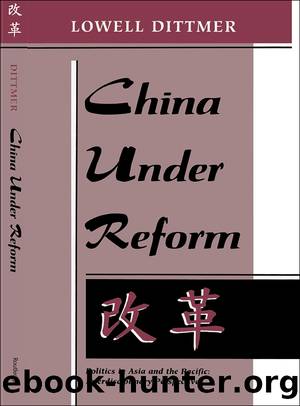China Under Reform by Lowell Dittmer

Author:Lowell Dittmer [Dittmer, Lowell]
Language: eng
Format: epub
Tags: Social Science, Political Science, World, Asian, Regional Studies
ISBN: 9780429973710
Google: 8tFMDwAAQBAJ
Publisher: Routledge
Published: 2018-02-19T07:04:06+00:00
The Structure of Political Publication
How does the public-private dichotomy relate to political power? Although both realms are repositories of power, that power takes quite different forms: The former manifests itself in public, in the light of day, to widespread applause; the latter is hatched in furtive plots, lurking in ambush, to emerge from hiding in surprise coups. Sun Tzu appreciated the potential of the private realm in his discussion of strategy (and Mao in turn appreciated Sun Tzu): âAll warfare is based on deception. Therefore, when capable, feign incapacity; when active, inactivity. When near, make it appear that you are far away; when far away, that you are near. Offer the enemy a bait to lure him; feign disorder and then strike him.â16 In the trade-off between public and private, the private sector relinquishes legitimacy for offsetting gains in power, whereas the public realm displays civil virtue without any real power (in the sense of politically significant choices). The reason for this bifurcation is that public performance implies conformity with the norms of selflessness, precluding the appearance of the particular interests that motivate political demands in China as in every other political system, not to mention the dirty tricks required for successful political war fighting, deal making, and power mongering. Power can be effectively pursued only in private, advertised in the form of policy only after cleansing all trace of its self-aggrandizing, âunprincipled,â and conflictual origins. In the early stages of the policy process âprivatizationâ is indispensable, however unseemly.
In answer to our question, we thus have two continuums, one between public and private, the other between power and legitimacy. Power corresponds to the private realm, policy to the public. In the passage from power to policy, a given decision must proceed through a series of forums, progressing from highly private ones to ever more public ones. Private forums are characterized by greater confidentiality, permitting Realpolitik to be conducted in businesslike, sometimes brutal fashion; they are also more informal in procedure, permitting the meetingâs chair or convener to override various technicalities to cobble together an effective majority and crush any opposition. Public forums meet on a more regularly scheduled basis, are more apt to be governed by rules of procedure (e.g., minutes, a set roster of participants, announced agenda), and even provide avenues for public disclosure (e.g., sessions open to media coverage, a concluding communique).
As is consistent with the cultural assumption that publicity equals virtue, the CCP has historically opposed the privatization of meetings in principle.17 Indeed, at the extreme end of the spectrum in terms of both privatization and unalloyed power mongering is the faction, which is prohibited. Factions must hence meet clandestinely, in a private venue. Those excluded or anticipating exclusion from formally sanctioned forums, due either to the nature of their affiliation or to the subject of their meeting, may form such a privatized cabal as a last-ditch expedient, but if they do so their activities will remain murky, win or lose, due to their illicit status. They
Download
This site does not store any files on its server. We only index and link to content provided by other sites. Please contact the content providers to delete copyright contents if any and email us, we'll remove relevant links or contents immediately.
| Anthropology | Archaeology |
| Philosophy | Politics & Government |
| Social Sciences | Sociology |
| Women's Studies |
Cecilia; Or, Memoirs of an Heiress — Volume 1 by Fanny Burney(32561)
The Great Music City by Andrea Baker(32021)
Cecilia; Or, Memoirs of an Heiress — Volume 2 by Fanny Burney(31958)
Cecilia; Or, Memoirs of an Heiress — Volume 3 by Fanny Burney(31944)
We're Going to Need More Wine by Gabrielle Union(19050)
All the Missing Girls by Megan Miranda(16038)
Pimp by Iceberg Slim(14515)
For the Love of Europe by Rick Steves(14149)
Bombshells: Glamour Girls of a Lifetime by Sullivan Steve(14078)
Talking to Strangers by Malcolm Gladwell(13375)
Norse Mythology by Gaiman Neil(13372)
Fifty Shades Freed by E L James(13245)
Mindhunter: Inside the FBI's Elite Serial Crime Unit by John E. Douglas & Mark Olshaker(9346)
Crazy Rich Asians by Kevin Kwan(9295)
The Lost Art of Listening by Michael P. Nichols(7507)
Enlightenment Now: The Case for Reason, Science, Humanism, and Progress by Steven Pinker(7315)
The Four Agreements by Don Miguel Ruiz(6767)
Bad Blood by John Carreyrou(6625)
Weapons of Math Destruction by Cathy O'Neil(6283)
